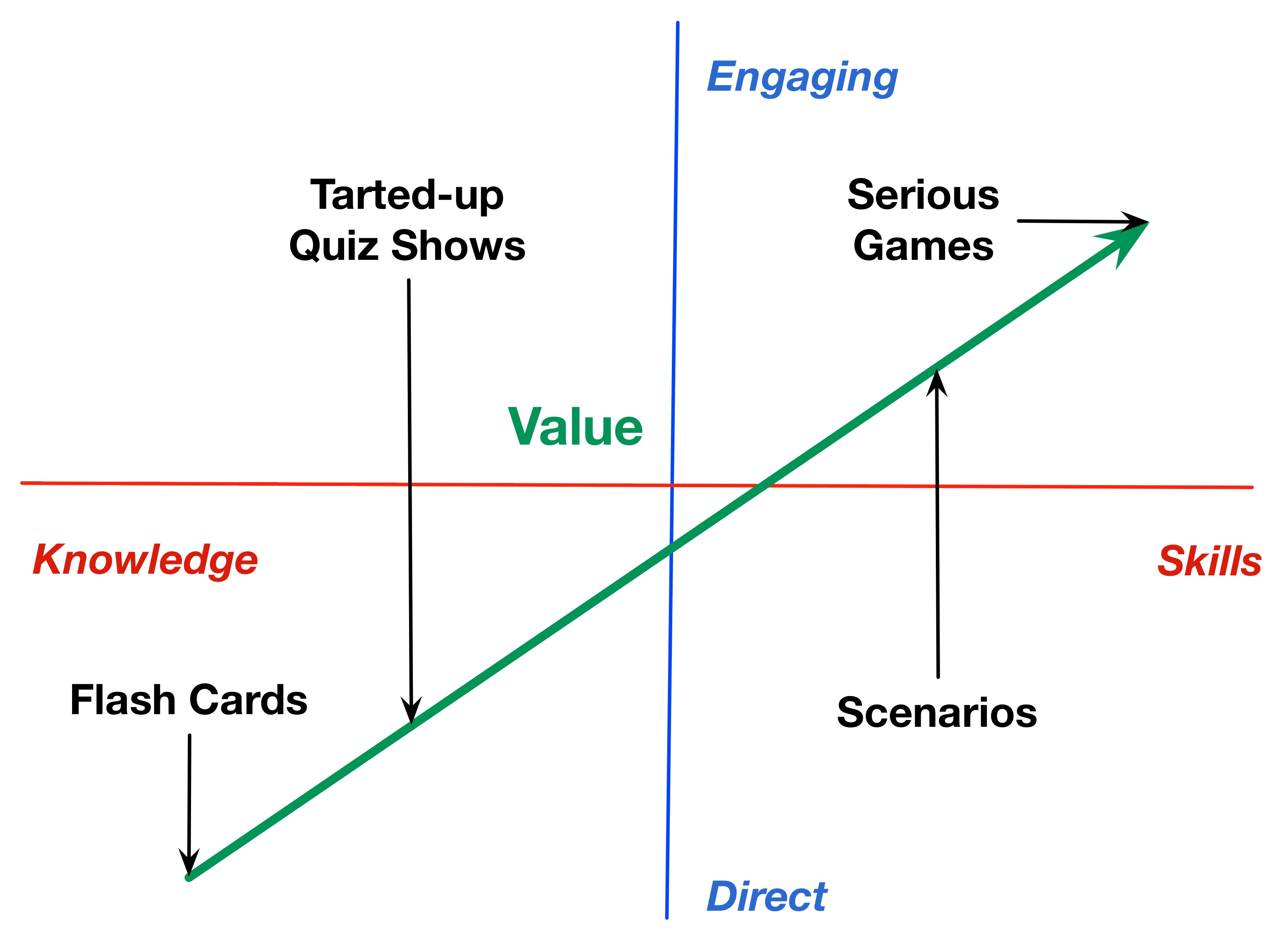A colleague recently queried: “How would you support that Jeopardy type games (Quizzes, etc.) are not really games?” And while I think I’ve discussed this before, I had a chance to noodle on it on a train trip. I started diagramming, and came up with the following characterization.
 I separated out two dimensions. The first is differentiating between knowledge and skills. I like how Van Merriënboer talks about the knowledge you need and the complex problems you apply that knowledge to. Here I’m separating ‘having’ knowledge from ‘using’ knowledge, focusing on application. And, no surprise, I’m very much on the side of using, or doing, not just knowing.
I separated out two dimensions. The first is differentiating between knowledge and skills. I like how Van Merriënboer talks about the knowledge you need and the complex problems you apply that knowledge to. Here I’m separating ‘having’ knowledge from ‘using’ knowledge, focusing on application. And, no surprise, I’m very much on the side of using, or doing, not just knowing.
The second dimension is whether the learning is essentially very true to life, or exaggerated in some way. Is it direct, or have we made some effort to make it engaging?
Now, for rote knowledge, if we’re contextualizing it, we’re making it more applied (e.g. moving to the skills side), so really what we have to do is use extrinsic motivation. We gamify knowledge test (drill and kill) and make it into Jeopardy-style quiz shows. And while that’s useful in very limited circumstances, it is not what we (should) mean by a game. Flashy rote drill, using extrinsic motivation, is a fall-back, a tactic of last resort. We can do better.
What we should mean by a game is to take practice scenarios and focus on ramping up the intrinsic motivation, tuning the scenario into a engaging experience. We can use tools like exaggeration, humor, drama, and techniques from game design, literature, and more, to make that practice more meaningful. We align it with the learners interests (and vice-versa), making the experience compelling.
Because, as the value chain suggests, tarting up rote knowledge (which is useful if that’s what we need, and sometimes it’s important, e.g. medical terminology) is better than not, but not near as valuable as real practice via scenarios, and even better if we tune it into a meaningful experience. Too often we err on the side of knowledge instead of skills, because it’s easy, because we’re not getting what we need from the SME, because that’s what our tools do, etc, but we should be focusing on skills, because that’s what’s going to make a difference to our learners and ultimately our organizations.
What we should do is be focusing on better able to do, moving to the skill side. Tarted up quiz shows are not really games, they’re simplistic extrinsic response trainers. Real, serious, games translate what Sid Maier said about games – “a series of interesting decisions” – into a meaningful experience: a series of important decisions. Practicing those are what will make the difference you care about.
I like this framing. To me the question isn’t “Is Jeopardy a game?” I don’t really care (thought for the record, I think it IS a game, it’s just a crappy game).
The value question is a *much* more useful framing. The real question is “Is Jeopardy a valuable learning experience?” In my opinion, not so much.
My biggest issue with Jeopardy style games for learning is the lack of context. We are taking the information and putting it in a context that will never occur in the real world, and are missing out on all the benefits that good context can provide (http://willthalheimer.typepad.com/files/aligning-learning-and-performance-contexts_v2009.pdf).
Thanks for these thoughts, Clark, completely agree. Knowledge-based games can be helpful if they better engage the learner than traditional lecture or elearning. But we need more training (games or otherwise) that effectively develops and anchors critical business skills. I’m clearly biased, but think the learning models leveraged via serious games can be exceptionally effective in accomplishing this.
I agree, but… what about a purely “knowledge-based” topic, which is a very common in K12/Higher Education? For example, teaching students to recognize the elements in the Periodic Table… A Jeopardy or other frame-based game is effective in helping students learn characteristics of elements in the table, and the challenge is a motivator. Of course this is very rote, but aren’t there instances when frame-based games and extrinsic motivation is appropriate?
Curtis, I suggest that pure knowledge isn’t of much value, except in the context of meaningful work. So I like to put the meaningful application front and center (and if knowledge needs to be ‘in the head’, e.g. medical vocabulary, make the situation such that they need to know it). Then (and only then) might you make available a mechanism for drilling that knowledge into the head (and those are the ‘very limited circumstances’ I refer to).
But too often we resort to knowledge when it won’t make a difference, so put the meaningful application first, and follow up if/when necessary with your frame-based extrinsics. As you suggest, there *are* instances…just not as many as we tend to believe.